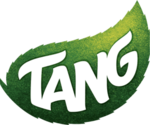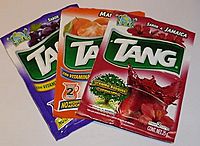Tang (drink mix) facts for kids
 |
|
 |
|
| Type | Artificially flavored drink mix |
|---|---|
| Owner | Mondelēz International (except North America) Kraft Heinz (North America) |
| Introduced | 1957 |
| Markets | Worldwide |
| Previous owners | General Foods Kraft Foods Inc. |
Tang is a well-known American drink mix brand. It was created by a food scientist named William A. Mitchell and a chemist named William Bruce James in 1957. Tang first appeared in stores as a powder in 1959.
Today, Mondelēz International owns the Tang brand in most countries around the world. However, Kraft Heinz owns the Tang brand in North America.
Tang's sales were not very high at first. But then, NASA started using it on space missions! Astronaut John Glenn took Tang with him on his Mercury flight in February 1962. It was also used on later Gemini missions. Because of this, many people thought Tang was invented just for space travel, but it wasn't. Tang is still used on NASA missions even now, more than 50 years after it was first made.
Contents
The Story of Tang
How Tang Was Invented
The orange-flavored Tang was created and given its special name by food scientist William A. Mitchell and chemist William Bruce James in 1957. Tang was first tested in stores in 1958. It became available for everyone to buy in 1959.
Tang and Space Travel
Early NASA space flights used Tang. In 1962, astronaut John Glenn drank Tang during his eating experiments in space aboard Friendship 7. It was also used on some Gemini flights and many Space Shuttle missions.
Even though other soda companies sent special canned drinks into space, astronauts often preferred Tang. This was because it was easy to mix into the water containers already on board. Astronaut Buzz Aldrin once mentioned he didn't prefer Tang. In his book, Return to Earth, he explained that he and his Apollo 11 crewmates chose a grapefruit-orange mix instead of Tang for their citrus drink.
Other Inventions by Tang's Creator
The person who created Tang, William A. Mitchell, also invented other famous foods. These include Pop Rocks candy, Cool Whip, and a type of instant-set Jell-O. Chemist William Bruce James also helped create several Jell-O flavors.
Early Advertising for Tang
When Tang first came out, the orange flavor was sold in glass jars. These jars had a shiny green label and an orange metal lid. Tang was advertised as an "instant breakfast" drink, not just a soft drink. This was because it had added vitamins C and A. In ads, Tang was called the healthy "space age" drink of the astronauts.
In the 1990s and early 2000s, Tang advertisements often featured an orangutan as a fun mascot.
What's in Tang?
Tang is sold as a powder or a liquid that you mix with water. For the Original Orange flavor, a suggested serving is about 2 tablespoons (31 grams) of powder mixed into 8 US ounces of water.
A single serving of Tang has about 29 grams of sugar. This means sugar makes up most of the product's dry weight. It also provides 100% of the daily recommended amount of vitamin E and vitamin C. It has 6% of the daily recommended calcium. One serving has a total of 120 calories.
Different Kinds of Tang
New Flavors Over Time
In 1961, General Foods introduced a grapefruit-flavored Tang. It was advertised as a new, natural-tasting flavor. This version came in a glass jar with a yellow label and a green metal lid. Later, in 1971, the packaging was updated with an orange metallic label.
In 1971, a grape flavor of Tang was also introduced. It first had a metallic blue label and lid, then a metallic purple one. While orange Tang came in many sizes, the grape flavor was only available in an 18-ounce size.
Changes to the Recipe
In 2007, Kraft introduced a new orange Tang that used artificial sweeteners instead of half the sugar. This new version was advertised as having "1/2 the sugar of 100% juice." The new formula was more concentrated, so smaller containers could make the same amount of drink.
In 2009, another version of Tang came out in 20 US ounce containers. These made about 6 US quarts of drink.
Today, orange-flavored Tang is still the most popular worldwide. However, many other flavors are available globally. These include grape, lemon, mango, and pineapple.
Tang Sales Around the World
Tang is sold in more than 30 countries. The flavors available can be different depending on where you are. The top three places where Tang sells the most are Brazil, Argentina, and the Philippines.
In the Middle East, more than half of Tang's yearly sales happen in just six weeks around the holy month of Ramadan.
In June 2011, Kraft Foods announced that Tang had become a "billion-dollar brand." This means its global sales had almost doubled since 2006. In 2010, Tang held a leading 15.6% of the international powdered drink mix market. However, like other sugary drinks, sales in developed countries have slowed down. This is because people are choosing drinks with fewer calories. In 2018, Tang's maker, Mondelez, reported a drop in sales after the Philippines added a tax on sugary drinks.
See also
 In Spanish: Tang (bebida) para niños
In Spanish: Tang (bebida) para niños
 | Frances Mary Albrier |
 | Whitney Young |
 | Muhammad Ali |

